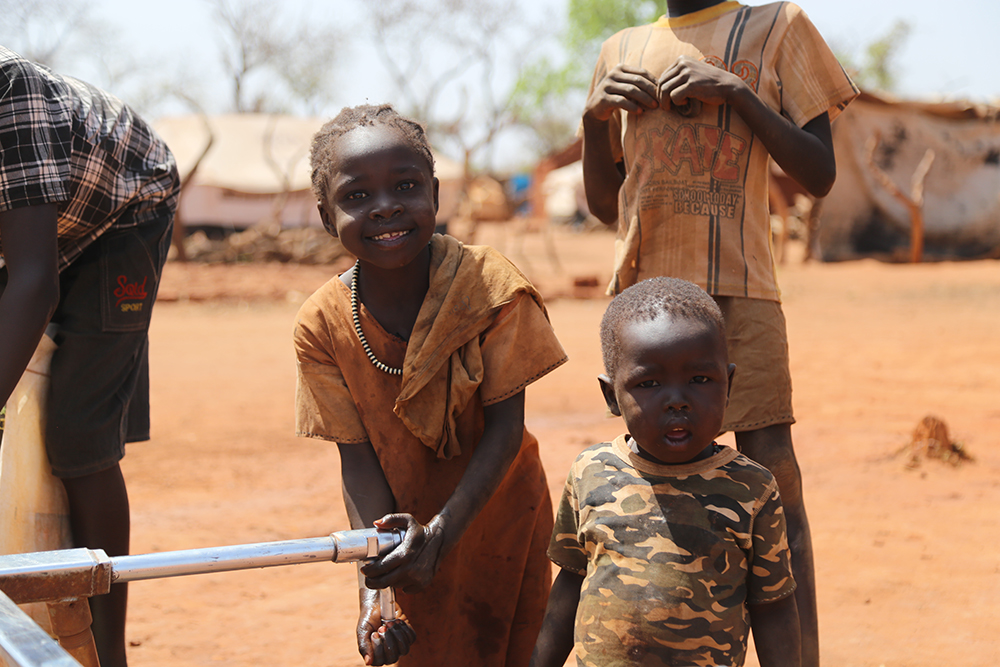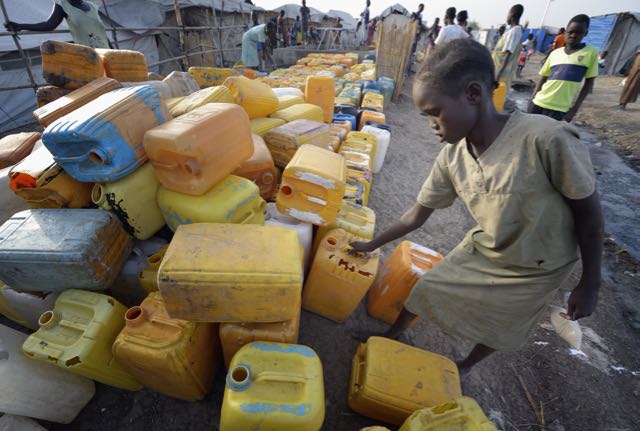Clean Water
How far would you walk for clean water?
Water is a matter of life and death in South Sudan.
It’s one of the most basic human needs, yet nearly 60% of the people don’t have access to reliable, safe drinking water.
Imagine having to choose between drinking dirty, disease-ridden water and walking for miles—hopefully avoiding landmines and violent, roving gangs and militias—just to find clean water.
This is a choice that countless women and young girls face every day. Throughout South Sudan, as in much of Africa, young women risk life and limb to find fresh water sources, rivers, and mud holes and bring water back to their families’ homes.
Every morning, during the dry season, young women and girls make the courageous and necessary choice to seek water for their families. They hide behind trees and bushes from warring gangs who scour the area, looking for enemies or vulnerable victims. Girls who leave the protection of their villages are often beaten and raped, if not killed. They’re also at risk of being maimed or killed by landmines that still hide beneath the surface of peaceful-looking fields and valleys.
Women and children shouldn’t have to risk their very lives just to get clean water. One well in each village could save thousands of lives and spare innocent young women and girls from harm.

Will you join us to bring clean, lifesaving water to remote villages throughout this poor country?
Your help today will be used to fund bringing engineers, rigs, pumps, and other tools and equipment to the remotest villages, as well as the construction of a new bore well, which can provide clean water for up to 2,000 people.
Clean water within a village means that children will be protected from deadly waterborne diseases. It means that people will no longer suffer from thirst and dehydration. It also means that little girls and young women will no longer be forced to risk rape and murder to find water for their families.

Children and families are so desperate and thirsty that they often fill containers with water from muddy holes and rivers.
If you could just smell or see how filthy the water is—you wouldn’t believe it. It’s tainted with bacteria, parasites, and even excrement from animals and birds.
And there is only a brief moment of relief in the rainy season. But the heavy rain during this time often turns into flooding waters in small villages and roads, which quickly contaminates the rainwater.
More than 2,500 South Sudanese have been infected with cholera, and more than 1.6 million have severe malaria. Waterborne diseases are ravaging the country, killing more people in this country than anywhere else in the world.
At any one time, every other child is sick with fever or malaria, and every fourth child with diarrhea. Around 75 percent of all child deaths in South Sudan are due to preventable diseases, such as diarrhea, malaria, and pneumonia.
Digging borehole water wells will not only supply these isolated areas with fresh flowing water, but it also means young girls won’t have to risk their lives looking for water.
Fourteen thousand dollars might seem like a lot of money, but digging a well is no easy task.

A displaced girl waits for water to be turned on inside a United Nations base in Malakal, South Sudan. More than 20,000 civilians have lived inside the base since shortly after the country’s civil war broke out in December 2013, but renewed fighting in 2015 drove another 5,000 people, including this woman, into the relative safety of the camp.
First, we need to get our team to these remote villages, most of which have no roads. Then, we need to transport a rig, drill, pump, and all the necessary tools. While digging, it is critical that the construction team set up special casings and walls to block out the surrounding soil and other impurities from entering the water supply. Once the water supply has been discovered, a platform and pump are installed to contain the water and to provide it to users in a safe and efficient manner. Finally, numerous tests are run on the water quality to ensure it is clean and pure and ready to be delivered to the community.
Despite the challenges, we are determined to make clean, lifesaving water accessible so that people will no longer suffer from thirst, dehydration, and diseases that come with unsanitary conditions.
And right now, I am praying that you will help us deliver lifesaving water to these children, women, and families.
So please, give what you can today.
Thank you for your caring heart and generosity.
P.S. With no food to eat and ongoing war, our work has never been more important.
You’re our only hope when it comes to providing hungry children with the food they need to survive.







